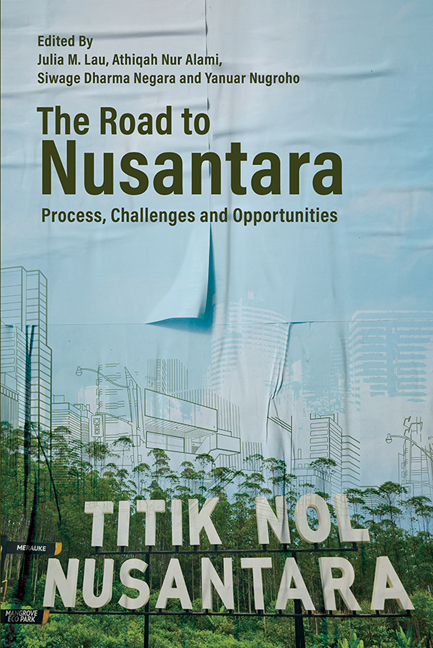Book contents
- Frontmatter
- Contents
- List of Figures
- List of Tables
- Foreword
- Foreword
- The Contributors
- Glossary
- Introduction: The Road to Nusantara—Process, Challenges and Opportunities
- PART I PROCESSES AND PATHWAYS TOWARDS NUSANTARA
- PART II CHALLENGES IN DEVELOPING NUSANTARA
- PART III OPPORTUNITIES FOR NUSANTARA
- Conclusion: Shaping Nusantara
- Index
Introduction: The Road to Nusantara—Process, Challenges and Opportunities
Published online by Cambridge University Press: 01 March 2024
- Frontmatter
- Contents
- List of Figures
- List of Tables
- Foreword
- Foreword
- The Contributors
- Glossary
- Introduction: The Road to Nusantara—Process, Challenges and Opportunities
- PART I PROCESSES AND PATHWAYS TOWARDS NUSANTARA
- PART II CHALLENGES IN DEVELOPING NUSANTARA
- PART III OPPORTUNITIES FOR NUSANTARA
- Conclusion: Shaping Nusantara
- Index
Summary
After many years of discourse, in 2019 the Indonesian government decided to build a new capital city (Ibu Kota Negara, IKN) in the Penajam Paser Utara and Kutai Kartanegara municipalities, East Kalimantan province. The new capital city is named Nusantara, which means “archipelago”, and it is planned that Nusantara will replace Jakarta as the main site of Indonesia's central government starting in 2024.
The capital relocation will mark significant transformations for Indonesians, not only in administrative, cultural and socio-economic aspects but significantly, in national politics. Jakarta has been the centre of gravity for Indonesia's government, business, culture and society since pre-independence days. Therefore, relocating the capital city to Nusantara, East Kalimantan, is perceived as a political commitment by the current administration to shift the national centre of gravity to a region outside Java.
Narrowing the developmental imbalance between Java and the outer islands has been at the heart of the capital city relocation narrative. Java, known for its overpopulation, is home to 152 million people (around 56 per cent of Indonesia's population), according to the most recent census in 2020.1 This contrasts sharply with the 6 per cent of Indonesians who live in Kalimantan, which is six times larger than Java island. With its massive demographic advantage, Java produces about 59 per cent of the country's GDP. East Kalimantan is nevertheless among the provinces with the highest gross regional domestic product (GRDP) per capita, second only to Jakarta. Yet, East Kalimantan is underpopulated, with just 3.7 million inhabitants or about a third of Jakarta’s.2 The opportunity for growth is thus significant.
The other main reason cited for the capital city relocation is that Jakarta is deemed increasingly unsuitable to be the nation's capital, given its numerous cross-cutting socio-economic and environmental challenges. Despite public policy efforts to control the effects of growth, worsening traffic congestion, pollution, and the increased risk and cost of frequent flooding have all adversely affected the quality of life in the city. IKN Nusantara, in contrast, is considered by some to be less exposed to natural disasters and is strategically located in the country's geographic centre.
- Type
- Chapter
- Information
- The Road to NusantaraProcess, Challenges and Opportunities, pp. 1 - 8Publisher: ISEAS–Yusof Ishak InstitutePrint publication year: 2023

